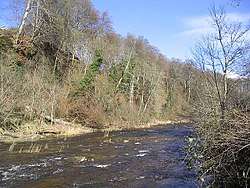Jed Water
The Jed Water is a river and a tributary of the River Teviot in the Borders region of Scotland.
| Jed Water | |
|---|---|
 The Jed Water near Jedburgh | |
 | |
| Physical characteristics | |
| Source | Carlin Tooth |
| • location | 1 mile from England in the Cheviot Hills |
| • coordinates | 55°18′55″N 2°34′50″W |
| Mouth | Jedfoot Bridge |
• location | north of Jedburgh, Scotland |
| Length | 21.75 miles (35.00 km)[1] |
| Depth | |
| • minimum | 0.37 metres (1.2 ft)[2] |
| • maximum | 2.33 metres (7.6 ft) (exceptionally 3.5 metres (11 ft))[2] |
| Basin features | |
| River system | River Tweed |
In total the Jed Water is over 21.75 miles (35.00 km) long and it falls 1,375 feet (0.419 km). It flows into the Teviot near Jedfoot Bridge (grid reference NT660243) two miles north of Jedburgh. Jed Water rises from a source on Carlin Tooth 55°18′55″N 2°34′50″W in the Cheviot Hills where it is first known as Raven Burn.[3]
Description
The river in past times was the main source of water for the monks living in Jedburgh Abbey. It also powered a watermill in the town of Jedburgh although this no longer exists. It gives its name to Jedburgh and Jedforest. In the 1800s it had trout in the river. The Ordnance gazetteer said Jed Water "in the parts immediately above the town of Jedburgh ... more of the elements of fine landscape than during a whole day's ride in the most favourite Scottish haunts of tourists."[1] The guide drew attention to the pure waters, the brisk currents, the steep landscapes and the contrasts which it thought picturesque.[1]
The name Jed is of obscure origin.[4] James has suggested that it may derive from Proto-Indo-European *wei(h1)- d- "a bend, something curved or twisted".[5] He also notes that Scots Gedde- in Jedburgh may have been adopted from Cumbric gwï:δ "a wood", and that the river name may be a back-formation.[5]
In 1787 James Hutton created modern geology when he discovered Hutton's Unconformity at Inchbonny, Jedburgh, in layers of sedimentary rock on the banks of the Jed Water.[6] He later wrote of how he "rejoiced at my good fortune in stumbling upon an object so interesting in the natural history of the earth, and which I had been long looking for in vain".[7]
Flooding
Jed Water is liable to flood, so the river levels are monitored near the old Canongate Bridge. The depth is usually between 0.37 metres (1.2 ft) and 2.33 metres (7.6 ft) metres deep but it has been as deep as 3.5 metres (11 ft) which it reached in January 2016.[2] In 2020 there was a problem when the flood defences in Jedburgh were breached by debris in one storm just before another storm hit. Luckily repairs were made and serious flooding was avoided.[8]
References
- Ordnance Gazetteer of Scotland: A Survey of Scottish Topography, Statistical, Biographical and Historical, edited by Francis H. Groome and originally published in parts by Thomas C. Jack, Grange Publishing Works, Edinburgh between 1882 and 1885.
- "Jed Water at Jedburgh: River level and flood alerts". riverlevels.uk. Retrieved 2020-03-24.
- "Jed Water from The Gazetteer for Scotland". www.scottish-places.info. Retrieved 2020-03-22.
- Mills, A. D. (2011). A Dictionary of British Place Names. Oxford: Oxford University Press. p. 261.
- James, Alan G. (2014). The Brittonic Language in the Old North: A Guide to the Place-name Evidence (PDF). Volume 2: Guide to the Elements. pp. 380–381. Archived from the original (PDF) on 2014-09-11.
- "Jedburgh Official Website". Hutton's Unconformity. Archived from the original on 2 February 2012. Retrieved 8 July 2011.
Whilst visiting Allar's Mill on the Jed Water, Hutton was delighted to see horizontal bands of red sandstone lying 'unconformably' on top of near vertical and folded bands of rock.
- Keith Montgomery (2003). "Siccar Point and Teaching the History of Geology" (pdf). University of Wisconsin. Retrieved 2008-03-26.
- "'Urgent' flood defence repairs successful". BBC News. 2020-02-14. Retrieved 2020-03-22.
External links
| Wikimedia Commons has media related to Jed Water. |